Is your postman delivering drugs?
- Published
Large amounts of illegal drugs are being delivered unknowingly by UK postal workers with few checks, Radio 1 Newsbeat has found.
For several months we have been investigating drugs in the post bought on the dark web.
We heard that "millions of pounds of drugs are bought online every day" via the hidden layer of the internet where dealers can sell drugs anonymously.
Royal Mail said it does not knowingly carry any illegal items in its network.
Newsbeat spoke to delivery staff who said they had "definitely handled suspect packages" but there was "nothing they could do".
You can also explore this story in a different way. Newsbeat Explains is a new way of experiencing news piece by piece - click here to try it with this story, external.
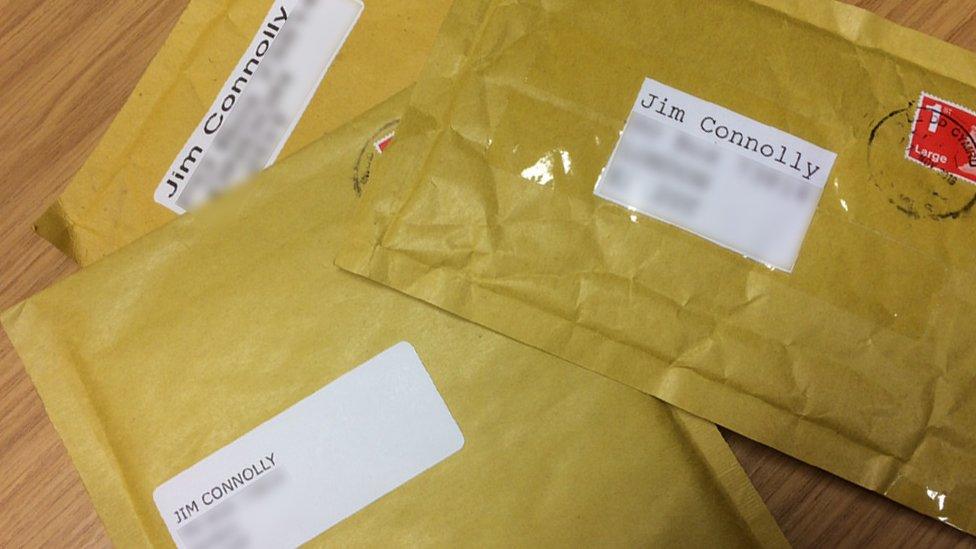
Packages sent from dark web drug suppliers to our reporter
There are fears that users buying drugs this way are more likely to widen their substance choices, with dangerous consequences.
And users we spoke to believe there's a "99% certainty" that drugs ordered via the dark web will get to them.
The Home Office says it is spending £1.9m trying to "increase understanding" in how organised crime networks "adapt and diversify" using technology.

Yvette Cooper visited Newsbeat to see our findings for herself
Chair of the Home Affairs Select Committee, and Labour MP, Yvette Cooper is looking at how the police can "keep up with new and changing forms of crime".
"We need to know there's a proper approach to enforcement taking place," she tells Newsbeat.
"One of the things we want to know is how the police are able to co-operate with different organisations.
"What is happening to link up [the police] with postal services or with customs or with other organisations? What's the government doing to lead this?"
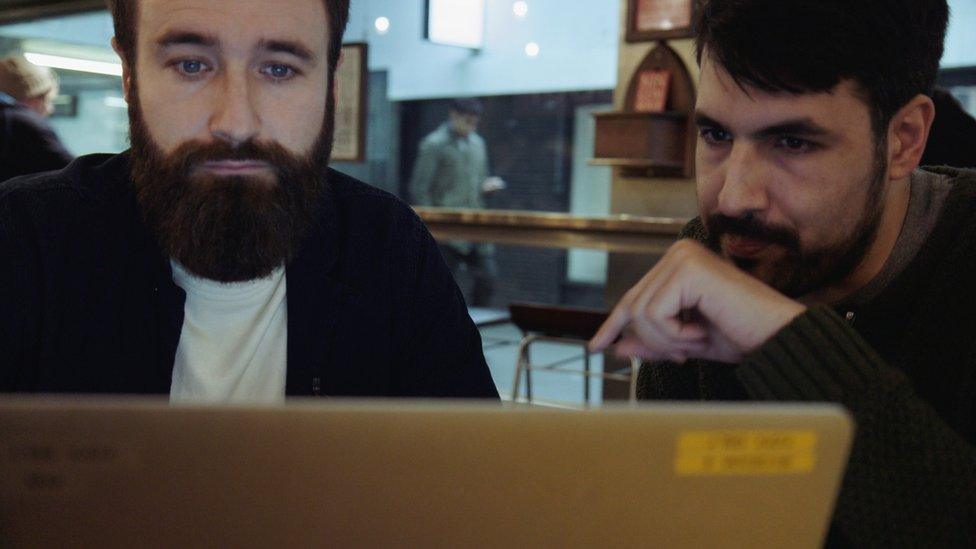
Newsbeat reporter Jim Connolly logs onto the dark web with Chris Monteiro, an independent cyber-security expert
How we tested the system
Newsbeat obtained MDMA, cannabis and former legal high, Spice using Bitcoin on the "dark web", a collection of thousands of websites that use anonymity tools to hide their IP address.
This part of the internet also contains a marketplace for drugs like heroin and steroids - as well as weapons and fraudulent documents.
We accessed the dark web via the Tor browser, free software which conceals users' identities and their online activity from surveillance.
Deliveries to a PO Box took around a week to arrive.
When they did, we gave them to a government-approved lab for testing and destruction.
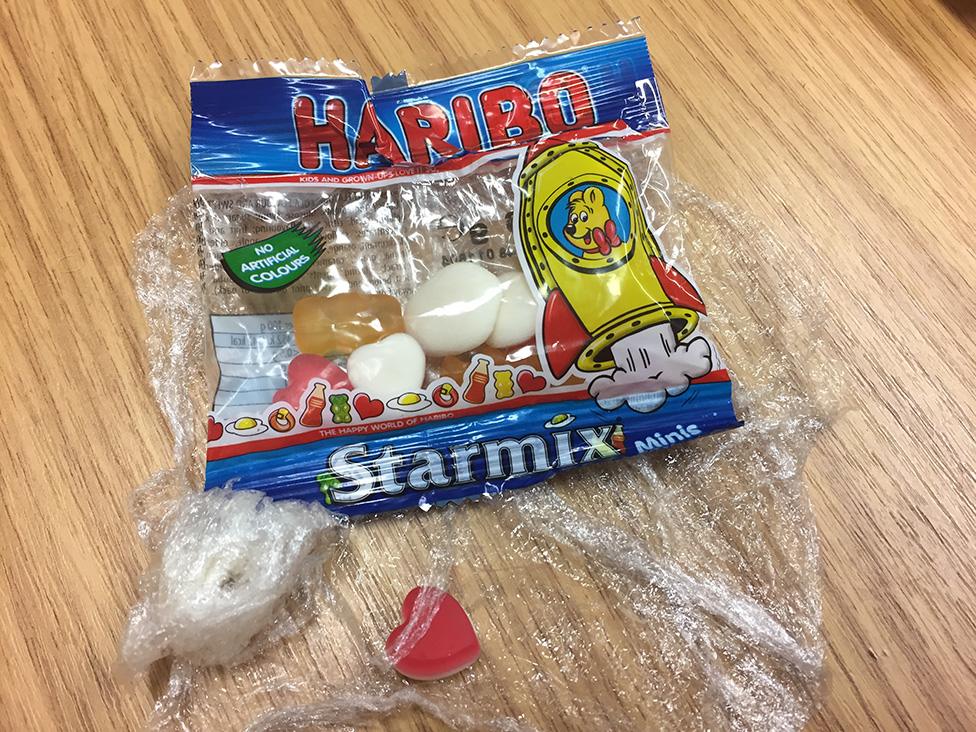
An ecstasy pill we bought on the dark web arrived wrapped inside a packet of Haribo sweets
"Unless there are massive raids on markets any time soon" causing "a loss of consumer confidence", this "hidden" drug market will keep growing, says Chris Monteiro, an independent cybersecurity expert and researcher.
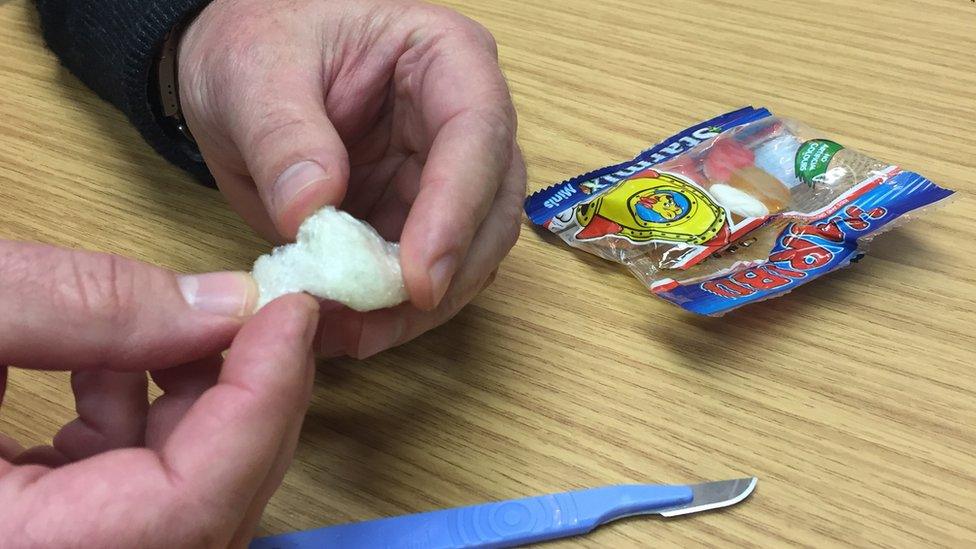
The pill was packed inside cling film to make it feel soft
"Talk of better prices and improved purity will continue to spread and eat away at the offline market," he explains.
And he adds: "Government and police are more interested in data breaches and weapons [than drugs]."
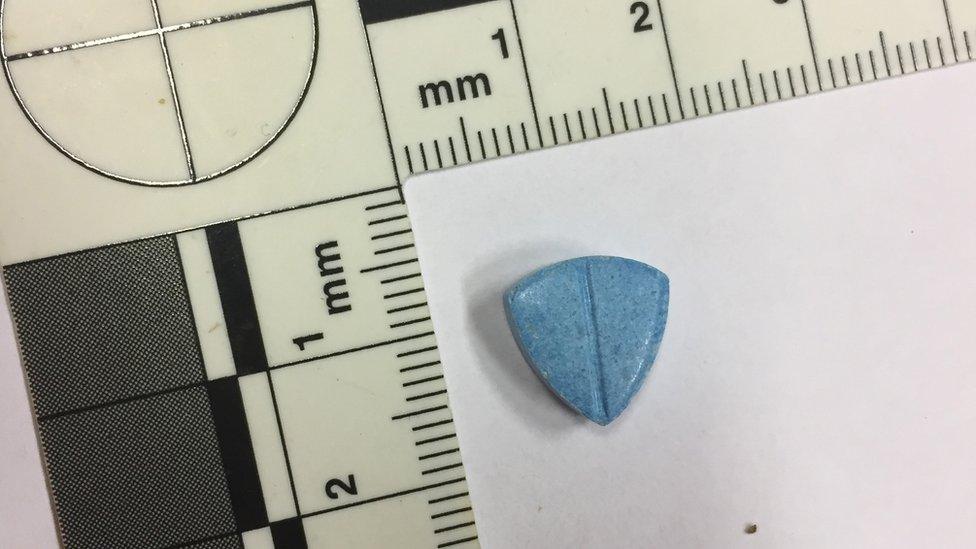
But there is no guarantee of what you are really buying on the dark web
Waiting for a special delivery
Former user "Steve" tells Newsbeat he bought marijuana, cocaine, ecstasy, and psychedelic stimulants on the dark web.
He describes a time he and a friend ordered drugs to take to a festival.
"We were waiting for a package, for an ounce of MDMA to be delivered.
"We see the postie drive down and we get very excited. She gives me the package, I sign for it... happy doo-dah.
"Me and my friend found it incredibly funny how she gave us the post - and had no idea.
"She handed it over and said 'thank you very much' and I said thank you very much.
"She had no idea she was a part of the drugs trade."
What "Steve" did was illegal and could have resulted in a jail term for possession of drugs with intent to supply.
What post workers told us
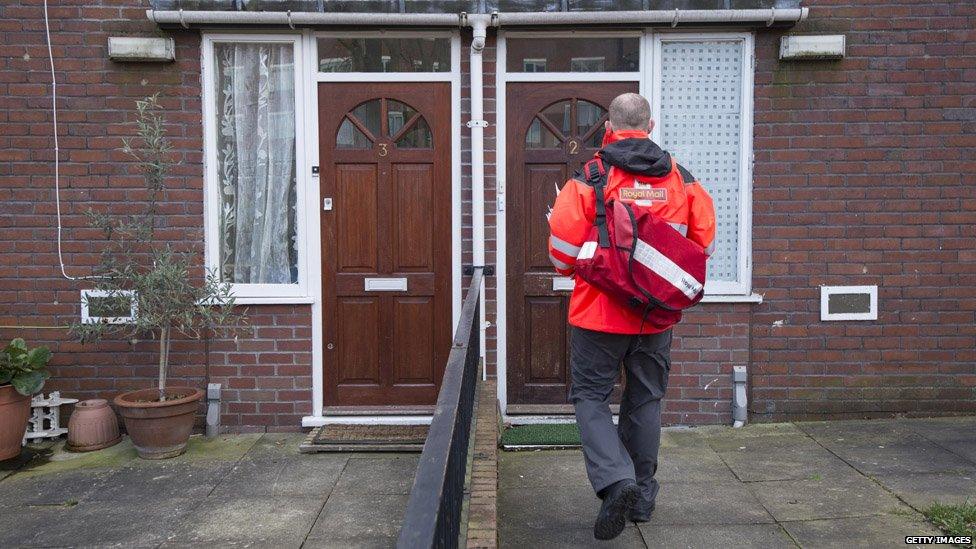
We went out with a postman who wanted to remain anonymous.
"Patrick" told us that it's illegal for him to open suspect parcels and there's "nothing he can do about it".
"You tell the managers and all they say is you need to deliver it."
He added: "If it's got a stamp on it, you post it. We don't have drug dogs to smell every parcel. We don't have the resources to X-ray every parcel. We just have to deliver it and take the risk.
"Our job is to deliver it safely to the customer."
Newsbeat has been told that some random spot-checks do occur but most staff we spoke to had never seen a sniffer dog.
"I've spent 14 years as a postman in uniform and I have never seen a drug dog," one worker at a London depot said.
Another said: "You hear rattling of things like pills and assume they're legitimate, but how would we know?"
"I've definitely handled suspect post, but once we have it in our mail bag we have to deliver it," said another.
On a forum used by postal workers we heard from a number of people who all noted that they had handled packages which had smelled of cannabis.
Many described there being more checks in the past when the depot had a customs office on site. Mail being sent within the UK does not seem to undergo the same scrutiny.
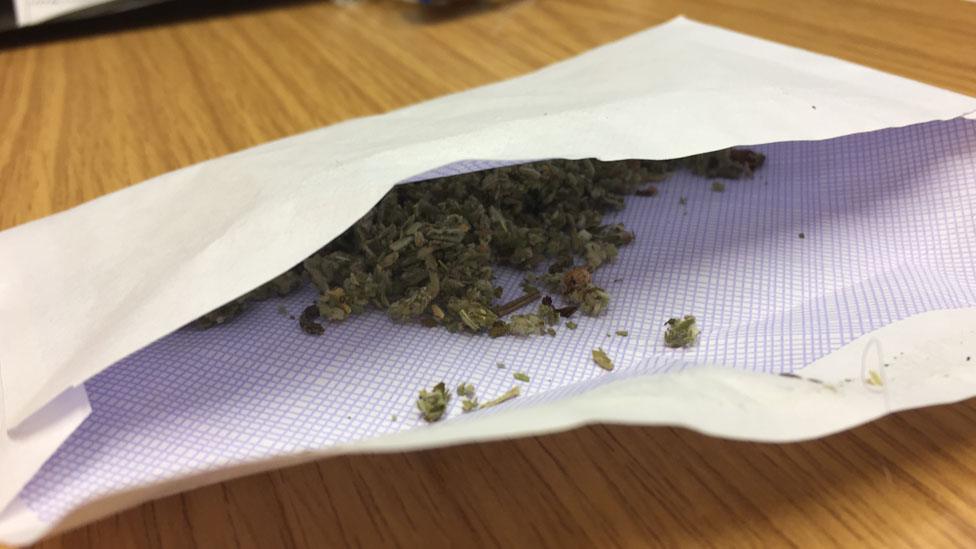
Are people trying new drugs because of the dark web?
Yes, according to data from the Global Drug Survey, external [GDS].
"About a third of people said they'd broaden their drug-using repertoire," says Dr Adam Winstock, from Kings College and GDS, who also says "millions of pounds of drugs are bought online every day".
"So it's like 'we've noticed you like LSD and magic mushrooms, perhaps you'd be interested in 2CB or DMT'...
"I think there is absolutely that effect," he tells Newsbeat.
"You're always worried that an increase in repertoire increases the likelihood that someone comes across something that might be harmful."
One in five people who responded to the 2016 Global Drug Survey said they had bought drugs on the dark web - or had friends buy them for them.
Are any countries tackling drugs in the post?
In New Zealand more has been done to stop drugs in the post.
"New Zealand is an anomaly in that only 2% of those who took our survey said they'd bought drugs on the dark net," says Dr Winstock.
"The reason people don't go shopping on the dark net in New Zealand is because there's really good co-operation between the police and the postal services and their borders are unbelievably good."
This more joined up approach has led to New Zealand's customs service seizing three times as many suspect packages over the past two years.
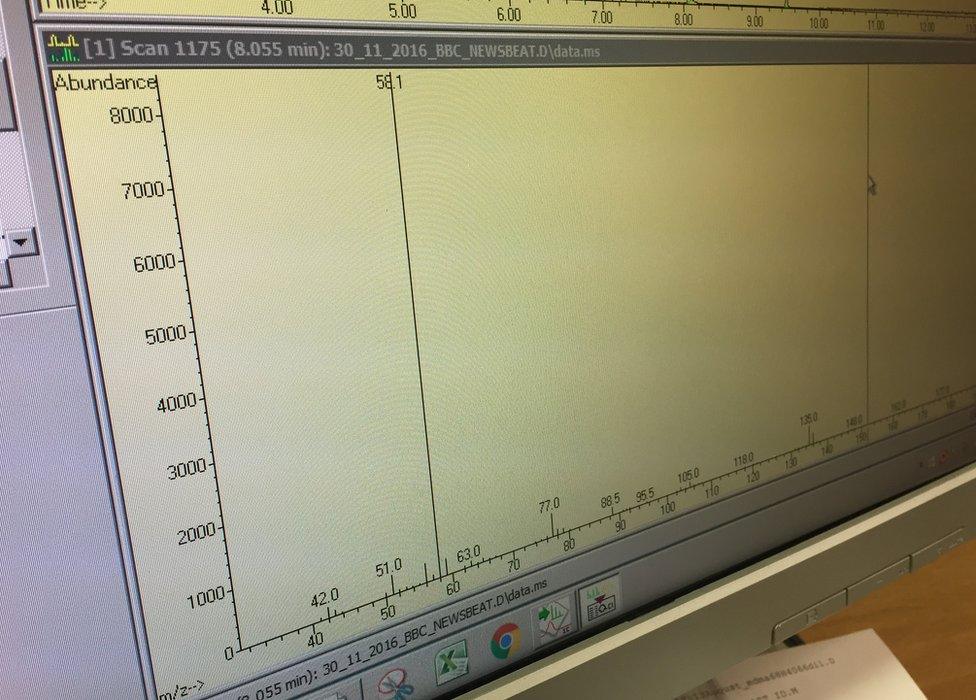
We bought an ecstasy pill on the dark web for £5 plus £3 postage. Tests found the pill's only active ingredient was MDMA
What British authorities say they are doing
In a statement, the Home Office told Newsbeat: "We have committed to spending £1.9bn on cybersecurity over the next five years, including boosting the capabilities of the National Crime Agency's National Cyber Crime Unit, increasing their ability to investigate the most serious cyber crime."
A Royal Mail spokesman said: "Where Royal Mail has any suspicion that illegal items are being sent through our system, we work closely with the police and other authorities including the Medicines and Healthcare products Regulatory Agency to assist their investigations and to prevent such activities from happening."
Find us on Instagram at BBCNewsbeat, external and follow us on Snapchat, search for bbc_newsbeat